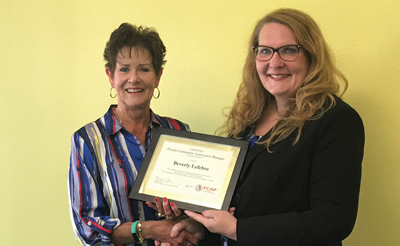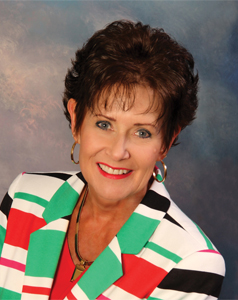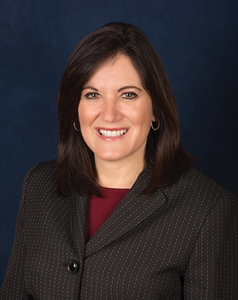
FCAP Community
Published August 2019
Florida Community Association Professionals’ (FCAP) training is offered on two levels. Level one consists of courses meeting Florida’s continuing education requirements for CAMs, and level two is the Florida Advanced CAM Studies (FACS) course. For further information about the more than 50 online continuing education classes available or to pursue the Certified Florida Community Association Manager (CFCAM) designation, please visit www.fcapgroup.com/membership/education-training/.

Betsy Barbieux with Florida CAM Schools presents Beverly Lefebre with her CFCAM Certificate of Completion
FCAP Congratulates Beverly Lefebre—OUR New CFCAM
On May 8, Beverly Lefebre obtained her Certified Florida Community Association Manager (CFCAM) designation.
Beverly, the owner of ProperKey Management and Realty, has more than 14 years of experience in community association management, real estate, and design concepts. Having an associate degree in specialized technology, Beverly started an interior design business: Nuoy Interieurs LLC. She became a licensed real estate agent in 2014 and worked at La Rosa Realty for close to two years. In 2017, Beverly became a licensed community association manager and started ProperKey Management and Realty, a firm that handles both community association management and real estate.
When asked what main issues are facing community association managers in 2019, Beverly responds, “One BIG issue is transparent communication. Communication is essential in any walk of life. It is vital for a healthy relationship, including associations. Additional issues are the constant changing of laws and lack of standardization between condominiums (718), co-ops (719), and HOAs (720) in the statutes. Guidance is lacking in the statutes [too much gray area]. This is what I’m seeing… 718 has the most laws, 720 has the least laws, and 719 is somewhere in between. This leads to confusion for board members, homeowners, CAMs, and even attorneys.”
When asked what led to her decision to pursue the CFCAM designation, Beverly says, “Education is priceless; you can never know too much and can always learn something new every day. The CAM industry is constantly evolving, so you need to keep pace with the changes. The training is essential. CAMs come together to share their insights of what they learned through experience: problem solving, understanding cause and effect, and understanding limitations based on the unique guidelines of a community. This knowledge sets me apart from other CAMs without the designation.”
Beverly Lefebre is an example of excellence in the industry. Congratulations again to Beverly on obtaining her CFCAM designation!
 FCAP Congratulates Sandra Hack—Our New CFCAM
FCAP Congratulates Sandra Hack—Our New CFCAM
On May 15, Sandra Hack became the latest community association manager to obtain her Certified Florida Community Association Manager (CFCAM) designation.
Sandra has had an extremely diverse career leading up to becoming a CAM. Sandra’s career began as a flight attendant for US Airlines, where she worked for 15 years. Following her time with US Airlines, she worked for 20 years as a dental assistant and surgical nurse. During this time, Sandra also owned Strawberry Delight (ice cream stand/restaurant) and Hack Construction company.
Following her business ventures, Sandra became a CAM and had a one-year contract with Indian Hammock Hunt and Riding Club HOA, where she was responsible for hiring 15 employees, overseeing new construction projects, and overseeing a cattle land lease, which created a yearly income of $24,000 to the community. She also owned her own property management company, South Florida Financial Advisors & Management Group Inc. Sandra currently works for Condominium Associates, where she manages more than 1500 homes.
When asked what the most challenging aspects of her job are, Sandra says, “Community compliance standards enforcement, fines, finding qualified vendors who will perform, contract enforcement, and work-life balance.”
Why did she decide to pursue the CFCAM designation? Sandra responds, “I pursued the CFCAM designation to add to my knowledge base and raise the level of advisement that I may lend to a
community. It is imperative that we continue to grow our profession and make people aware of the work and dedication it takes to be successful. A board is only as good as the knowledge that a manager may provide.”
Sandra is another example of excellence in the industry. Congratulations again to Sandra on obtaining her CFCAM designation!
Because You Asked
By Betsy Barbieux, CAM, CFCAM
Betsy,
Every lot/unit in the park has a physical file in a secured filing cabinet. Each lot/unit file has two separate files in them: one is confidential, and one has an audit sheet attached that I created to audit files for missing information, which we should have. I assume everyone has something similar. My question is, is it important to have all the information within these files scanned into the computer also? When I started this, it was mentioned that it needed to be done, but it is very time consuming, and I have not gotten very far. Does it need to be done? It will take a great deal of memory in the computer also for all this information. If it is required or has a real reason behind why it needs to be done, I can do it, but now I question, what is the reason? If a shareholder asked to view someone’s file, it would be much easier to purge the physical file before they view it. Of course, we try to put all correspondence, complaints, violations, etc. in their physical files so everything is together for each resident.
Thanks for answering my questions, and I’m glad to know you are always available.
-Michelle
Michelle,
I don’t know anyone who keeps this much detailed information! There may be some managers who do, but I’ve never received these detailed types of records from a former management company.
The information and records that you have are incredible and may be the preference of your community, but there is no law requiring such detail. I am not saying that what you have is wrong, but it does consume a lot of time and manpower.
There is a day coming when our records will be stored offline in a separate hard drive and not on your computer. If you start scanning from this point forward the documents in the files, you would use an external drive with some sort of terabyte memory.
For the little communities that I took over, the management companies before me did not have any paper files for the lots or units at all. Nor did they have any electronic owners’ files that were useful that they could deliver to me on a thumb drive.
I have created paper files and electronic files for each of the lots and units in my communities. The only thing in the files are the warranty deeds and estoppels and any other correspondence related to that unit or home, such as ARC approvals or violations. We don’t keep any detailed information on owners other than what is required for the financial records, and I don’t have any records at all on rentals.
-Betsy
Betsy,
I have a few more HOA questions for you.
- Can a board member attend a board meeting via phone?
- Do we need a lawyer to make an amendment to our Declaration of Covenants? Who would make up the legal paper to file with the court and get the proper wording for the amendment? My personal thought is that we should have some sort of legal representation for the community.Remember, we are a small community of 72 homes without any amenities except street lighting.
- Last but most importantly, does the board of an association have the authority to vote a resident out of the homeowners association?
Thank you so much for your assistance. I know we are small enough to manage this on our own, but it is more than comforting to me as a board member to be able to ask you questions and get the proper answer. Thank you so much for your help.
-Sue
Sue,
To your questions—
- Yes, of course, board members may attend a board meeting via speaker telephone and vote as if present.
- Yes, you need an attorney to draft your Amendment to the Declaration. This is a legal document and should not be attempted by a lay person.
- No, all owners are members of the association. You can’t remove them unless they move or die!
– Betsy
Betsy,
There is always something new! Let’s say my neighbor installs solar collectors on his roof, and I have a tree entirely on my lot that shades his collectors for part of the day. Do you know of any regulation that requires me to remove my tree?
– Bill
Bill,
Below is ALL I know about solar collectors! I can’t see how on earth there could be some other regulation that makes a neighbor accommodate a neighbor with regard to solar collectors, but that’s too logical.
Section 163.04 Energy devices based on renewable resources.—
(1) Notwithstanding any provision of this chapter or other provision of general or special law, the adoption of an ordinance by a governing body, as those terms are defined in this chapter, which prohibits or has the effect of prohibiting the installation of solar collectors, clotheslines, or other energy devices based on renewable resources is expressly prohibited.
(2) A deed restriction, covenant, declaration, or similar binding agreement may not prohibit or have the effect of prohibiting solar collectors, clotheslines, or other energy devices based on renewable resources from being installed on buildings erected on the lots or parcels covered by the deed restriction, covenant, declaration, or binding agreement. A property owner may not be denied permission to install solar collectors or other energy devices by any entity granted the power or right in any deed restriction, covenant, declaration, or similar binding agreement to approve, forbid, control, or direct alteration of property with respect to residential dwellings and within the boundaries of a condominium unit. Such entity may determine the specific location where solar collectors may be installed on the roof within an orientation to the south or within 45° east or west of due south if such determination does not impair the effective operation of the solar collectors.
(3) In any litigation arising under the provisions of this section, the prevailing party shall be entitled to costs and reasonable attorney’s fees.
(4) The legislative intent in enacting these provisions is to protect the public health, safety, and welfare by encouraging the development and use of renewable resources in order to conserve and protect the value of land, buildings, and resources by preventing the adoption of measures which will have the ultimate effect, however unintended, of driving the costs of owning and operating commercial or residential property beyond the capacity of private owners to maintain. This section shall not apply to patio railings in condominiums, cooperatives, or apartments.
And under Section 718.113:
(7) Notwithstanding the provisions of this section or the governing documents of a condominium or a multi-condominium association, the board of administration may, without any requirement for approval of the unit owners, install upon or within the common elements or association property solar collectors, clotheslines, or other energy-efficient devices based on renewable resources for the benefit of the unit owners.
There is nothing mentioned about solar collectors under Chapter 719 or Chapter 720.
-Betsy
Betsy,
I am working with our post office to see about getting new mailboxes. Ours are very old and look awful. The new ones are different than the old ones as they are more like a drawer instead of a box shape; they also don’t have as many boxes per unit, so we will have more than before. Is this a material change, or does this fall more under a maintenance update?
I’m so glad you are here to assist. It makes me feel better when I can ask a question to someone with great knowledge! Thanks, from your ever-questioning student.
– Chelle
Chelle,
I believe you are describing changing the mailbox kiosks, and since the mailboxes are actually the property of the United States Postal Service, I do not think changing them is a material alteration. As always, you might want to check with your attorney.
-Betsy
An Inside Look at Short-Term Rentals in Sunny Isles Beach:
Ocean Reserve Condominium
Marcy L. Kravit, CMCA, AMS, PCAM, CFCAM
FCAP Education and Training Coordinator
AKAM ON-SITE Managing Director
Ocean Reserve is a luxury condominium in Sunny Isles Beach with 398 residential units. Facilities include a world class residential gym, tennis courts, a beautiful heated pool with cabanas, and 24-hour valet services. They are only steps away from the beautiful Sunny Isles beach located in South Florida south of Golden Beach and adjacent to Heritage Park, making this a top destination for families to visit. While they are not a hotel, units can be rented short-term directly from owners.
The association is managed by AKAM On-site. I had the opportunity to interview the president, David Matten, and executive manager, Yazmin Costa, to obtain an inside look at how the board and management have worked together in managing the local ordinances and challenges related to short-term rentals.
There is a growing number of condominium units that are being rented out on a short-term basis as vacation rentals due to the home-sharing trend of websites such as Airbnb, VRBO, and HomeAway, just to name a few. These are popular due to the option of offering a convenient method for unit owners to earn extra income through renting out their units to paying guests. It provides travelers with what is often a less expensive alternative to hotel accommodations.
Some cities believe that short-term rentals are fostering an environment for noise and criminal activities, which include but are not limited to drug trafficking and human trafficking. City ordinances have been considered and adopted to regulate the use of short-term vacation rentals in multi-family dwellings. The ordinances have been established to balance the interests of residents who are negatively impacted by short-term rentals with the rights of unit owners to lease their units for compensation to be exercised.
Interview with Ocean Reserve Condominium
Q: Do your governing documents address short-term rentals and leasing restrictions? If so, what are the provisions?
A: Our governing documents permit leases that are less than 30 days without board approval. There is no minimum lease term nor limit on number of times a unit may be rented annually provided the unit is in licensure compliance.
Q: When a guest arrives on property for one or two nights, is it safe to assume that he or she is not taking the time to review the association’s bylaws and rules and regulations, even if those materials are provided to the guest upon arrival? What steps have you taken to manage the flow of traffic?
A: Yes, most guests don’t take the time to read the rules and just want to get checked in as quickly as possible so they can enjoy their stay. We’ve added online check-in capability and software that helps us staff properly for heavy visitor days. I include an additional set of rules in the unit for each stay.
Q: What is the City of Sunny Isles Beach ordinance regarding licenses that recently passed, and what is your association doing to enforce it?
A: The City’s ordinance is similar to what we’ve been doing at Ocean Reserve for several years now. It requires owners to have DBPR licenses and pay state and city taxes along with having a responsible party available to address guest issues. We require any owner who short-term rents their unit to be in full compliance with our rules and the City ordinance.
Q: Due to the frequent turnover and new guests arriving on a daily, weekly, or monthly basis, what inconveniences has it created, and what interference has it caused for unit owners to peacefully enjoy their homes and use of the common areas?
A: During high season, we experience heavy traffic entering elevators and using the common elements. It takes longer to get a package, for example, but for those of us who enjoy living in a hotel-style environment, it’s a small price to pay. When you factor in the fees generated by short-term visitors, which help offset assessments, it’s a no-brainer.
Q: Has the increase in traffic caused more wear and tear on the property, increased the need to hire more staff, and had an impact on your budget?
A: The building currently allows just less than 2,000 people; therefore, at full capacity it’s the same wear and tear you would expect as the elevators, roof, and major structural elements depreciate over time. We do feel it at the pool, where there’s less concern over chairs by visitors than owners, so we lease the chairs with a warranty in case of damage. Additionally, more visitors does sometimes mean more water usage and extra staff.
Q: Are you charging any additional fees to subsidize the expenses? If so, what are they?
A: Yes, we charge a key fob activation fee and parking pass fee of $40 per check-in.
Q: How do you impose fines for those who do not comply with the condominium rules and regulations?
A: Most visitors are not aware of certain rules due to not having been informed by the owner who rented them the unit. If visitors knowingly refuse to abide by the rules, such as by holding a 3:00 a.m. terrace party, we cancel their stay, and they are required to leave.
Q: Short-term rentals present a legitimate safety concern for other unit owners, especially when a unit is rented by many different people each week or month. Renters are less familiar with the rules and policies that govern the association. The constant presence of unfamiliar faces throughout the common areas and a revolving door of guests in the hallways and lobby has the potential to create more noise and traffic, put some people on edge, and reduce other residents’ sense of security. What security measures or other methods have you taken to control vandalism, theft, and unruly behavior?
A: I live in Ocean Reserve now with my wife and our two daughters (9- and 10-years old), and we have never felt unsafe since our board implemented new rules and regulations. While there’s a high turnover of people, it’s no different than when staying in a 4-star hotel. We have more than 150 security cameras and monitor practically every corner of the property, including the garage. Additionally, all guests sign a waiver at check-in that allows us to evict them should they break any rules, and the staff also does a great job at ensuring everyone is in compliance.
The City of Sunny Isles Beach application requirements and standards can be located at www.sibfl.net/dept_zoning/short-term-rentals/. The City of Sunny Isles may refuse to issue or renew a license due to the owner or responsible party willfully withholding or falsifying any information.
Q: Do you find the application process challenging for your owners?
A: Many of our owners are international, so at first it was difficult to get everyone into compliance, but our team worked diligently with the City and owners to help ensure a smooth transition. There is room for improvement on the City’s side, but as with anything new, it will come in time.
Q: What tips or advice can you share with other condominium associations when considering short-term rentals?
A: Each community is unique, and you have to take all factors into consideration, such as long-term goals and the ramifications of short-term rentals to your building. Just be sure you have a streamlined process in place as we do, should your community vote to allow it.
If your association is considering allowing short-term rentals, the board should consider reviewing their association documents and adopting rules to regulate how the rentals are conducted. For example, the board should require unit owners to provide the association with the contact information of all guests including email addresses. In advance of the guest’s stay, require all guests to acknowledge and sign off on the rules regarding the use of the common areas. The board should also adopt a fining structure for the enforcement of the governing documents and the association’s rental rules and restrictions policies.
It is recommended that you consult with your association attorney to determine if your association has the right to allow short-term rentals, or if the documents do not address short-term rentals, you may want to consider amending them.
It is always advised to consult with your association attorney to provide legal guidance regarding the best approach that will protect the unit owners and work best for the association.
FCAP Member’s Spotlight
 10-S Tennis Supply
10-S Tennis Supply
If you are in the market for a tennis court supplier, 10-S is your best choice. We have the world’s largest selection of in-stock, ready-to-ship tennis court products for your day-to-day requirements, with more than 1,000 items ready for same day shipment.
-
-
- We shipped more than 1,000,000 items last year.
- We serve customers in all 50 states, every Canadian province, and most of the Caribbean, Central, and South American countries.
- We can ship our products anywhere in the world.
-
We have the world’s most knowledgeable tennis court supply staff. Our employees have an average of 15 years of experience sourcing, testing, and recommending tennis court supplies and equipment.
For more information on 10-S Tennis Supply, call (800) 247-3907 or visit www.10-S.com.
 Friends of Bats
Friends of Bats
We are a family-owned and -operated company, focusing exclusively on delivering safe and humane solutions to bat infestation issues throughout the state of Florida. Over our 15 years in business, we have successfully carried out bat removal services (exclusions) and colony infestation prevention services for our customers, both in the residential and commercial sectors.
Friends of Bats works closely with condominium associations and HOAs (including working on multi-unit/multi-story dwellings and high-rise structures), commercial buildings, bridges, and
single-family homes. We are fully insured, provide free inspections and firm price quotes, and guarantee all work.
For more information on Friends of Bats, please call Dan and John at (888) 758-2287 or visit www.friendsofbats.com.
 Kaye Bender Rembaum
Kaye Bender Rembaum
Kaye Bender Rembaum, a six-time FLCAJ Readers’ Choice Awards diamond-level winner for legal services, is a full-service law firm with offices in Broward, Palm Beach, and Hillsborough Counties, dedicated to the representation of community associations throughout Florida. The Firm prides itself on providing prompt, effective, individualized, cost-efficient, high quality, and understandable legal advice to all of its association clients. Led by a team of experienced attorneys, eight of whom are Board Certified in Condominium and Planned Development Law, the Firm assists clients in all matters of association representation including, but not limited to, the collection of assessments, contract drafting and negotiation, updating of governing documents, covenant enforcement, complex litigation, and construction defect claims.
For more information on Kaye Bender Rembaum, call (800) 974-0680 or visit KBRLegal.com. Follow us on Facebook at Facebook.com/KayeBenderRembaum.
 Reserve Advisors
Reserve Advisors
As the leading provider of reserve studies, Reserve Advisors is committed to delivering an exceptional reserve study experience by exceeding the needs of every client served. Our approach has been “Long-term thinking. Everyday commitment” since our very first reserve study completed in 1991. We’ve partnered with more than 10,000 clients, applying our core values and a highly skilled team as the leading provider of individually researched and written comprehensive reserve studies.
For more information on Reserve Advisors, call (800) 980-9881 or visit www.reserveadvisors.com.
 Southern Chute
Southern Chute
Southern Chute was founded on two principles: that happy employees are invested in their company, and that we will not take a customer’s money unless we can make a difference at their property. Eighteen years later, we have two offices and 20 employees, and we have you—our satisfied and loyal customers! We value the relationships and friendships that we have developed with you over the years.
Most of our employees have been with us 10 to 15-plus years. Many of you comment on how nice it is to see the same faces every year. Sandy and Joanna appreciate your continued support!
For more information on Southern Chute, call (866) 475-9191 or visit www.SouthernChute.com or www.TrashChuteParts.com.



